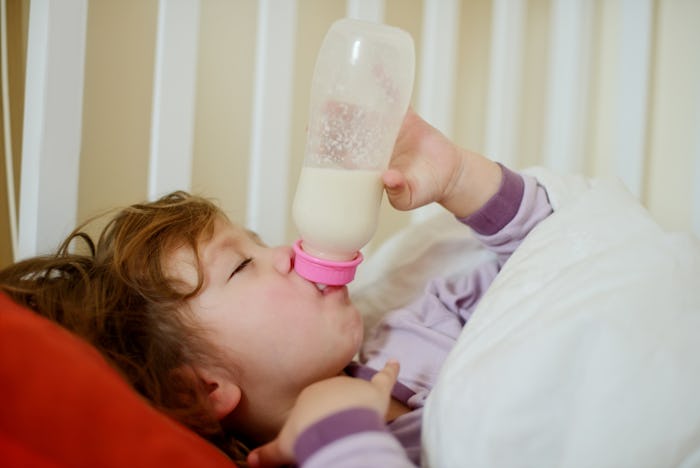Life

Here's How Letting Your Kid Keep The Bottle Can Affect Their Jaw & Teeth
I had horrible teeth growing up. So much so that my parents spent thousands of dollars on orthodontics for me starting at the age of 11. I had a palate expander, braces, night gear, a retainer, the whole nine yards. Recently, when I went back in to the orthodontist to get a correction, he said my teeth and palate were likely caused by my love of bottles as a toddler. And to be fair, I have memories of drinking from a bottle, I used one for so long. I am 35 and still feeling the effects of prolonged bottle feeding, and I wonder if my teeth were the only thing that got messed up because of it.
As it turns out, I was right to be curious. There is more at risk by drinking from a bottle for an extended period of time than just a mouth in need of expensive hardware. A recent study on the effects of prolonged bottle feeding published in Maternal and Child Nutrition found that children who use a bottle past the age of 1 end up drinking more calories than their cup-drinking counterparts. This can in turn lead to the development of more adipose tissue (fat) in the toddler, leading to a greater risk of obesity later on in life.
It's possible (OK, probable) that I took a bottle well past my third birthday. I have struggled with my weight my whole life. I've gained and lost hundreds of pounds over the course of my life, and I now wonder if my love of ice cold milk in a bottle as a baby contributed to that. To be honest, I never really got beyond my love of milk. It is still one of my favorite drinks to this day, even if I've switched to soy. I vividly remember as a child not wanting to drink anything but milk or orange juice — never water. That had to have been just a ton of calories, so it makes a lot of sense that it could be detrimental on a person's health.
The effects of prolonged bottle feeding are also seen in the teeth as well. I spoke with dental hygienist Amy Bloomberg of New York City and she tells Romper, "We see cavities over and over again in the kids who use bottles for a long time. Because they're constantly chewing on them or sucking on them, that milk pools in the mouth and eats away at the enamel of the teeth, causing cavities." She says they see a lot of what they refer to as "bottle rot," which means that the baby's teeth are literally rotting away from the sugars in the milk and sucking on the bottle.
It's also a vicious cycle. Rachel Gooze, a Ph.D. candidate in public health at Temple University’s Center for Obesity Research and Education, told HealthDay, "We definitely recognize stopping the bottle at a year of age is not easy, and stopping it at 2 years of age may be even harder." The longer you wait, the harder it will be to stop, and the problems will just be compounded.
And those problems include developing an overbite or a cross-bite — things known as problems of "occlusive development." According to the journal BMC Pediatric, children who use a bottle beyond the first year of life are at a much greater risk for a misaligned bite or teeth. Researchers found that "increased bottle-feeding duration may contribute to inadequate mandibular development, and that non-nutritive sucking habits can be a dominant and deleterious factor in the development of occlusofacial problems." In English? It's pulling their jaw and teeth out of whack.
In the end, there's more than sufficient evidence to get rid of the bottle after the first year, even though it's an absolute nightmare. Trust me, I remember.